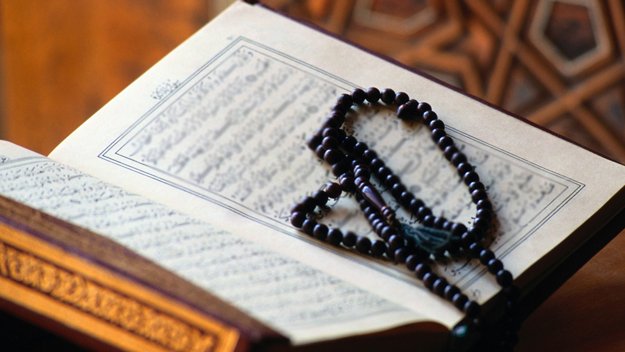One characteristic of the Qur’an is moderation or harmony between the divine and human, the spiritual and the material, the individual and the collective, and so on. The Qur’an pays due attention to all facts of life and all needs of man, and deals with them in such a way as to help man to realize the noble objectives of his being. For this approach of moderation, the Qur’an calls the Muslims a “middle nation” (Al-Baqarah 2:143), and with this “middleness” they are called the best people ever evolved for mankind, as they enjoin the right, combat the wrong, and believe in God (Aal `Imran 3:110).
The Qur’anic wisdom functions in three principal dimensions: inwardly, outwardly, and upwardly. Inwardly, it penetrates into the innermost recesses of the heart and reaches the farthest depths of the mind. It is aimed at the healthy cultivation of the individual from within. This inward penetration is different from and far deeper than that of any other legal or ethical system because the Qur’an speaks in God’s name and refers all matters to Him.
The outward function of the Qur’an embraces all walks of life and covers the principles of the entire field of human affairs from the most personal matters to the complex international relations. The Qur’an reaches areas unknown to any secular system of law or code of ethics and inaccessible to any popular doctrine of religion.
What is remarkable about the Qur’an in this respect is that it deals with human transactions in such a way as to give them a divine flavor and a moral touch. It makes the presence of God felt in every transaction and acknowledges Him as the first source of guidance and the ultimate goal of all transactions. It is man’s spiritual guide, his system of law, his code of ethics, and, above all, his way of life.
In its upward function the Qur’an focuses on the One Supreme God. Everything that was, or that is, or that will be, must be channeled into and seen through this focus, the active presence of God in the universe. Man is merely a trustee in the vast domain of God, and the sole purpose of his creation is to worship God.
This is no pretext for seclusion or passive retirement from life. It is an open invitation to man to be the true embodiment on earth of the excellent qualities of God. When the Qur’an in its upward attention focuses on God, it opens before man new horizons of thought, guides him to unexemplified standards of high morality, and acquaints him with the eternal source of peace and goodness.
Realizing God alone as the ultimate goal of man is a revolution against the popular trends in human thought and religious doctrines, a revolution whose objective is to free the mind from doubt, liberate the soul from sin, and emancipate the conscience from subjugation.
In all its dimensions the Qur’anic wisdom is conclusive. It neither condemns nor tortures the flesh, nor does it neglect the soul. It does not “humanize” God, nor does it deify man. Everything is carefully placed where it belongs in the total scheme of creation. There is a proportionate relationship between deeds and rewards, between means and ends. The Qur’anic wisdom is not neutral. It is demanding and its demands are joyfully welcomed by all those blessed with appreciation and understanding.
The wisdom of the Qur’an calls for truth in thought and piety in action, for unity in purpose and goodwill in intent:
{That is the Book; there is no suspicion about it, a guidance to the pious}(Al-Baqarah 2:2). {This is a Book which We have revealed unto you, in order that you might lead mankind out of the depths of darkness into light}(Ibrahim 14:1).
Excerpted with some modification from the author’s book Islam in Focus. The text is taken from WAMY website.
Dr. Hammudah Abdalati graduated from Al-Azhar University of Egypt. He received an MA in Islamic studies from McGill University and a PhD in Sociology from Princeton University. From 1967 till he passed away in September 1976, Dr. Abdalati was associate professor of sociology at Utica College of Syracuse University. For years he lectured on Islam, wrote articles in Arabic and English, and responded to inquiries.






 WhatsApp us
WhatsApp us 


2 comments
Should this moderation between the individual and the collective also not extend to moderation in terms of how we deal with others who hold different views on the the deen and history. We all preach moderation when it comes to showing the face of “true” Islam to the non-Muslim world but when it comes to our own people who happen to not follow our prescribed version of deen we create an atmosphere of intolerance most of the time. I agree largely with the article but sadly I think that moderation is seriously lacking on the street and from the mimbars – except for a few cases which I can count on my right hand in comparison to the hudreds of masajid that are out there. I dont mean to generalize but we have to point out that moderation has not been at the forefront of our approach with regards to inter-Muslim disagreements in the last few years. Infact it has become worse. Instead of using the Quran and prophetic(SAWA) teachings to bring Muslims together, to unify, we have an entire religious industry that aims to separate people by using the very same Quran.
veeeery good, even with the (im sure postive) modifications by VOC,
however, the "upward" movement, our ultimate goal is realised through firstly our inward and outward movements, our outward movements are an expression of our inward improvement and upward intentions,
so how can the sectarianism espoused and VOC and so actively supported by it being a vehicle for others' sectarian hatred ever be in sync with the above article or the quranic way?